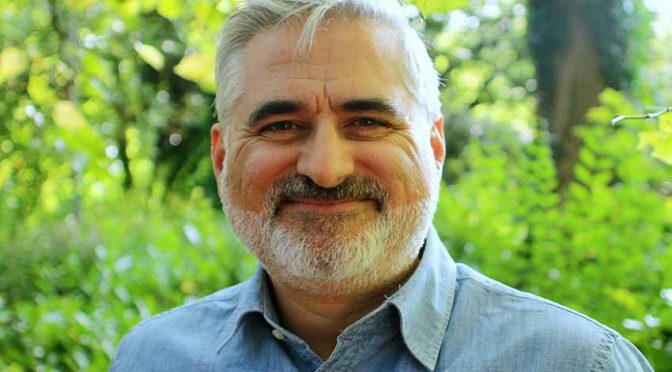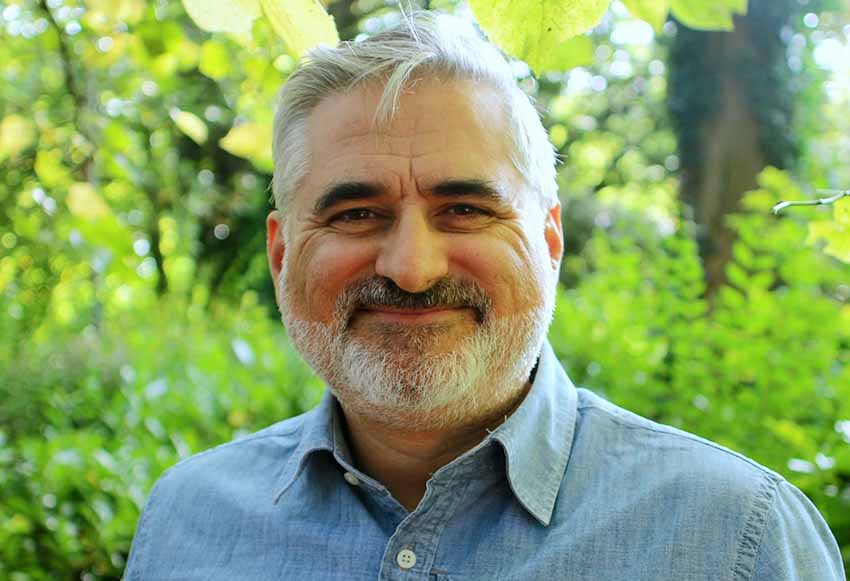
Pedro Oiarzabal has traveled the world, taking the pulse of Basque diaspora communities across the globe. In normal times, he can often be found at Basque festivals, talking to everyone he can, to understand what being Basque means. Currently, he is the co-lead of a project that aims to document the stories of Basque veterans of World War II. In this interview, Pedro discusses the evolution of Basque identity, the origin of his own interest in the immigration experience, and how Basque groups have used technology to keep connected during the pandemic.
Buber’s Basque Page: Pedro, while many know you through your various efforts to document the history of the Basque diaspora, there are likely a few who do not, so let’s start with an introduction. Who is Pedro Oiarzabal?
Pedro Oiarzabal: First of all, thank you Blas for your time and for the opportunity to share with you my thoughts and work on the Basque diaspora.
Pedro J. Oiarzabal was born and raised in Bilbao and has spent much of his life between the Basque Country, Ireland, and the United States. He holds a PhD in Basque Studies-Political Science from the University of Nevada, Reno. He is the Director of Social Innovation Research at Arima Social Lab. His research examines the interaction of diaspora communities with information and communication technologies, with particular emphasis on the Basque case. Among his publications are Gardeners of Identity: Basques in the San Francisco Bay Area (2009), Diasporas in the New Media Age: Identity, Politics, and Community (2010), and The Basque Diaspora Webscape: Identity, Nation, and Homeland, 1990s-2010s (2013).
I am just an ordinary person, quite fortunate to have a great family and wonderful friends who have always been behind me, supporting all my endeavors. I was raised in a happy home filled with love. Our parents instilled in us the ethics of work and the love for learning. They did everything for us so we could reach our dreams. For that, I will always be in debt to them.
BBP: Much of your professional work has focused on the diaspora. What attracted you to this specific subject?
Pedro Oiarzabal: At home, we grew up listening to stories about our relatives emigrating to Cuba and Mexico… In fact, my grandfather, my mother’s dad, left the farmhouse – the baserri – and made a new beginning in Madrid, Spain, where my mother was born; though, she grew up in the family’s baserri and was educated in Bizkaia. My great-grandfather, on my father’s side, also left his hometown in Gipuzkoa and made Bizkaia his new home. So, the narrative of migration has been a part of my entire life. My interest for the subject, for learning about our common history of migration from a family level to a macro level, has always been there. I also left my hometown of Bilbao when I was 22 years old to continue my university studies, which led me, years later, to the Center for Basque Studies at the University of Nevada, Reno. There, I obtained my PhD degree with the subject of the Basque diaspora and the Internet, opening up a new and exciting subfield in Basque Studies.
BBP: When I last interviewed you in 2006 (https://buber.net/Basque/2020/11/25/an-interview-with-pedro-oiarzabal/; we are getting old!), one of the questions we discussed was the evolving view of Basque identity. During the course of your career, how have you seen what it means to be Basque change or evolve?
Pedro Oiarzabal: Indeed, time has gone by since then, which means that we are still here enjoying another conversation on the meaning of Basque identity and its underlying factors. We are not the same as we were 14 years ago and for sure we will not be the same for our next talk in the near future. Similarly, our sense of individual and collective Basqueness has also been evolving with the pass of time. What I have learned in my studies during all those years is the growing importance that the emotional aspect of identity is gaining, particularly within the realm of the Basque diaspora. New Basque diaspora generations across the planet are increasingly relying on their Basque identity’s emotional side, which goes hand in hand with the prolific use and display of Basque symbols.
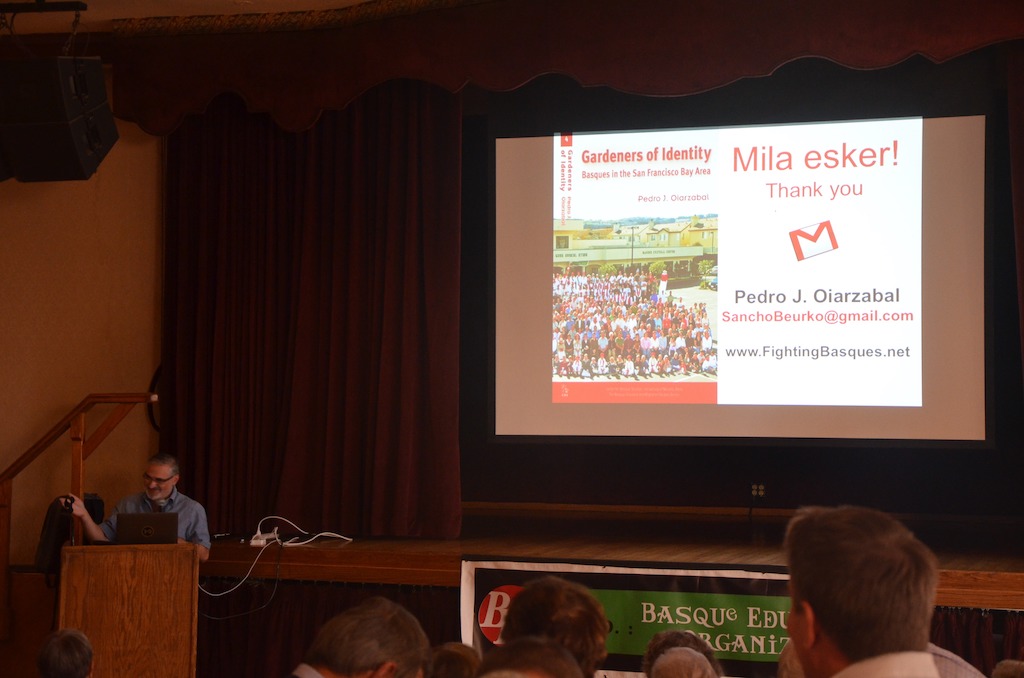
BBP: Can you elaborate on this point a bit? When you say that the emotional aspect of identity is growing, what aspect is then diminishing? Do you see the attachment to symbols overall positive, or is there some level of superficialness associated with it?
Pedro Oiarzabal: Anthropologists such as William Douglass and Lisa Corcostegui already expressed their concerns over the increasing dependency of symbols to elaborate different aspects of Basque identity in the diaspora and as you said the somehow superficialness associated with it. They talk about Basque diaspora identity in terms of becoming “more show than substance.” For instance, Basque Argentinean Mikel Ezkerro and Basque American John Ysursa, both historians, advocate for the importance of educating new generations. Basque children and teens may become masterful dancers but ignore why they dance what they dance. On St. Patrick’s Day, everybody is Irish, right? If you wear green, drink “green” beer (something unheard of in Ireland) etc., etc., does it make you Irish? Is this what the Basque diaspora is heading to? So, this takes us back to square one: What is today’s meaning of Basque identity in the world?
BBP: How do we avoid becoming a group, a culture, that is more show than substance? Are there examples you’ve seen, either in the Basque diaspora or in the broader immigrant communities, where people have been able to keep a real connection with their culture?
Pedro Oiarzabal: There are good examples of efforts carried out by Basque diaspora communities worldwide that continuously counteract the dangers of becoming more show than substance, by, for instance, teaching the language, culture, and history; organizing summer camps for their youngest members; collecting oral testimonies and local histories; and hosting public lectures and cultural tours in an attempt to educate and enhance the knowledge about all things Basque. Diaspora communities and their institutions are constantly struggling to survive and keep their traditions alive. Particularly, the pandemic and its consequences have really tested the Basque diaspora associations’ capabilities for survival. Many have passed this “stress test,” others without any external help will fail and may never recover. All those activities require resources. The cost of becoming a “show” is higher than the cost of keeping the “substance” behind the show. Can we afford to lose for good a single diaspora association?
BBP: Another question we discussed back then was the role of the Internet in helping groups such as the Basques maintain their identity. Do you think that promise has been largely fulfilled, or have important opportunities been missed? Has your view of the Internet and its role in maintaining identity changed over the years?
Pedro Oiarzabal: The result of my work demonstrates that the promise has been fulfilled, though unevenly. If not all, nearly all Basque diaspora clubs in the world have a presence in multiple platforms on the Web. The majority has really taken advantage of the opportunities offered by those platforms, and particularly by social network sites. Some others remain disengaged.
I think that physical confinement as a result of the pandemic – if anything positive has come out of this terrible situation – has helped many individuals and organizations at home and abroad to rethink and somehow renew their relationship with the Internet, the Web, and the social network sites. For instance, many Basque diaspora associations around the world have rediscovered the usefulness of those technologies in order to keep alive their social and cultural agenda, but 100% online. For some clubs this has been nothing new, for others it has been a new experience. Anyhow, the Basque diaspora nowadays is also an effective community, largely based on the Web and its social network sites.
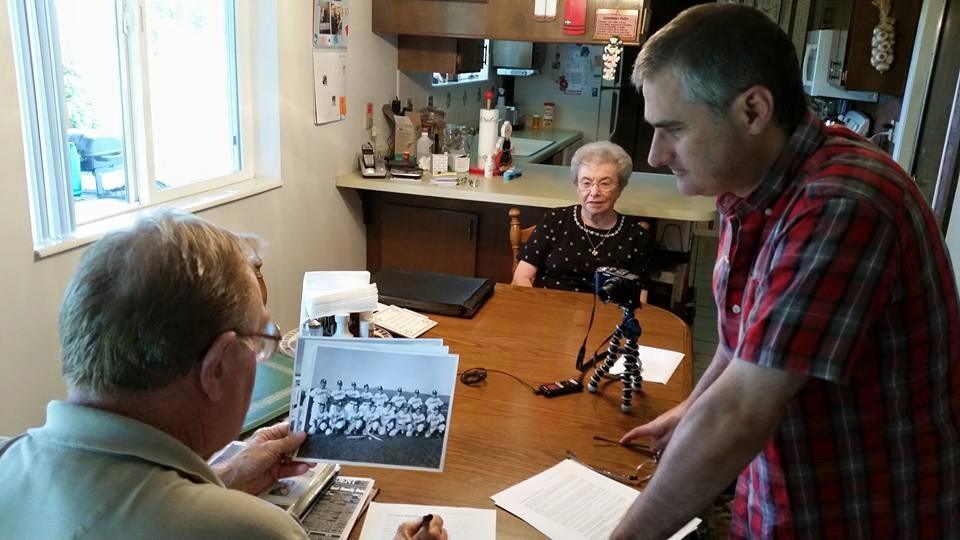
BBP: Your current project, “Fighting Basques,” focuses on the contributions of Basques in the diaspora to the efforts of World War II. How did this project arise? What drew you to this particular historical era?
Pedro Oiarzabal: The research project “Fighting Basques: Memory of World War II” was created by the Basque non-profit historical association Sancho de Beurko in 2015 with the goal of studying the Basque participation in the Allies side during WWII. Though I was involved from the very beginning with the project, my role was just as a consultant. Later on, the association offered me to lead the research project as co-principal investigator with Guillermo Tabernilla, founder of the association and a military specialist. By then, research had been completed regarding Basque involvement with the United Kingdom, Free France, and the Soviet Union during the last world war. Right now, under the auspices of the North American Basque Organizations, we have focused on Basque America’s contributions to the war efforts. So far, we have completed research in 33 States and Puerto Rico, with the result of writing up nearly 900 biographies. We are constantly publishing original articles on Basque WWII veterans on our blog, which you kindly translate for us, and we are producing a short documentary film on Basques in the US Marine Corps.
For being our “greatest generation” little academic attention has been given to our Basque veterans. Most history books had never recorded the involvement of Basques and Basques Americans in WWII under US leadership. This research project is a window through which to explore not only the military side of those men and women of Basque origin, which by itself is already good, but also to learn about their individual and family biographical histories. In a way, we will be able to study the migration and settlement history of hundreds of Basque families across the country from the mid-19th Century to post-WWII.
BBP: Is there a particular story that you found particularly inspiring or surprising?
Pedro Oiarzabal: Most, if not all, of the histories that we help to identify and make visible through the “Fighting Basques” project are perfect material for any Hollywood epic movie on WWII. It is difficult to just talk about one or another particular hero. We have Basque veterans in every single branch of the US Armed Forces and in every single Theatre of Operations throughout the world. For being a small ethnic community, the Basques had played a significant role in WWII. Our case study may help not only to educate our communities but for other researchers to learn about other migrant communities’ participation in the last world war.
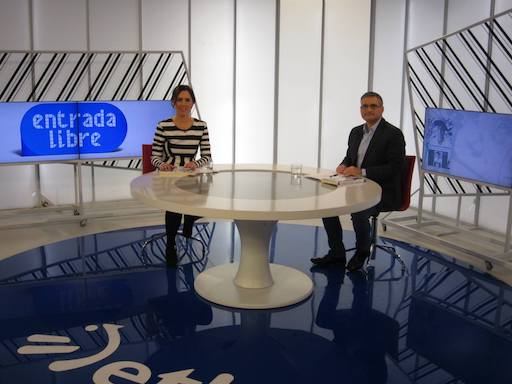
BBP: What other aspects of the Basque diaspora are you currently studying?
Pedro Oiarzabal: Beyond “Fighting Basques,” which takes most of my time, I continue conducting research on the Basque diaspora and its projection to the Web, with particular emphasis on the social network sites. Right now, I am looking into Instagram to find out how the Basque diasporans perform their identities and sense of belonging.
BBP: A big change in the Basque diaspora, at least in the United States, is the cutoff of the flow of immigrants from the Basque Country to the United States. In real ways, the direct connection we in the United States have with the Basque Country is being lost. How do you think we can best keep the relationship alive, even strengthen it?
Pedro Oiarzabal: For decades, many social scientists have called for the defunction of Basques at home and abroad, but we are still here. And there is no evidence suggesting that we will not be here in a near future. Basques are constantly leaving their home country but not in big numbers and not for exceptionally long time. In the US, it is quite common to hear among Basques that they are a “dying race.” It is perfectly understandable. The last migrant generation is disappearing and there are no newcomers (in massive numbers) for the past fifty years. The chain migration that began over a century ago has been broken. That direct connection that you mentioned is indeed (partially) lost. However, it has been somehow replaced by temporary visitors, family, personal and professional short stays in the Basque Country, educational exchange programs such as USAC, cultural and musical tours, mus tournaments (one of the most important transnational cultural programs of the Basques nowadays), mass media, the Web and its social network sites. It is up to us to keep those relationships alive, to keep our culture alive.
BBP: In many ways, 2020 was a lost year, with lots of plans and opportunities postponed or outright canceled. What are you most looking forward to in 2021, in terms of your research and travels?
Pedro Oiarzabal: Regaining a certain degree of “normality” would be a great step forward in our part of the world. Obviously, this would entail the physical participation in international academic gatherings and field research, which I miss the most. I am always open to new ideas, projects, and collaborations with private and public institutions, with a special emphasis on community-based work. Unfortunately, we live in a quite uncertain time, and it is not clear when this “normality” would be fully back. Maybe, it will not happen until the end of the year. So, for now, I will continue to take part in virtual conferences, while I am planning new venues of research maximizing the resources that exist on the Web.
BBP: Do you have any parting thoughts as we conclude this discussion?
Pedro Oiarzabal: Financial resources aside (which are always of great need), my work on the Basque diaspora has mostly been possible because of the active participation of individuals and associations, including the North American Basque Organizations, through the worldwide diaspora for which I am extremely grateful. Also, I would like to thank you for your time and for allowing me to discuss my research with you. Eskerrik asko bihotz bihotzez!
BBP: Mil esker, Pedro!

